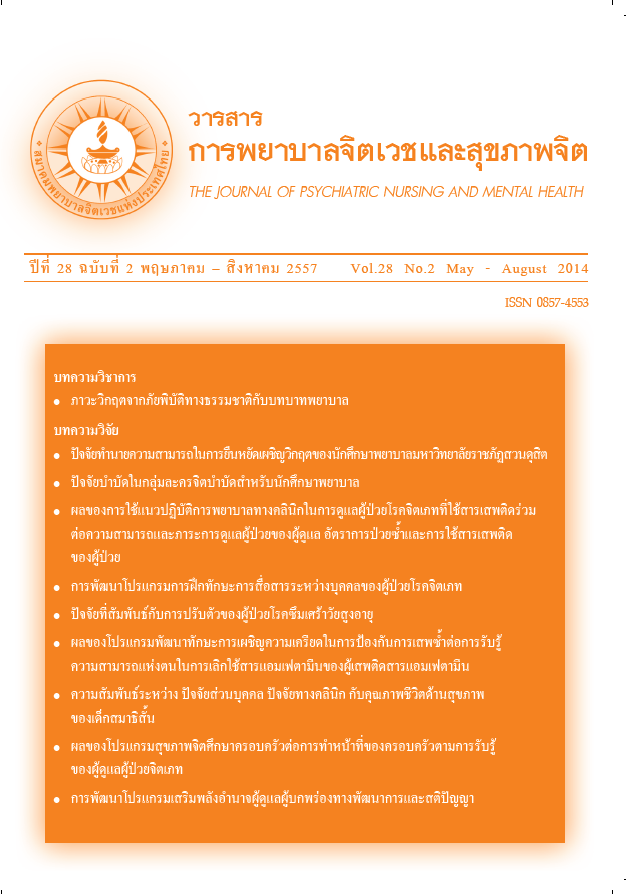การพัฒนาโปรแกรมการฝึกทักษะการสื่อสารระหว่างบุคคลของผู้ป่วยโรคจิตเภท
Main Article Content
บทคัดย่อ
วัตถุประสงค์: เพื่อพัฒนาโปรแกรมการฝึกทักษะการสื่อสารระหว่างบุคคลของผู้ป่วยโรคจิตเภท และทดสอบผลของโปรแกรม
วิธีการศึกษา: ประกอบด้วย 2 ระยะ คือระยะพัฒนาโปรแกรมและระยะการทดสอบผลของโปรแกรม ในระยะแรกโปรแกรมพัฒนาโดยการประยุกต์แนวคิดการสื่อสารระหว่างบุคคลที่มีประสิทธิภาพของเดวิโตและแนวคิดการเสริมแรงทางบวกของสกินเนอร์ และตรวจสอบความตรงตามเนื้อหา โดยผู้ทรงคุณวุฒิ 3 คน ระยะที่ 2 เป็นระยะทดสอบผลของโปรแกรมแบบสองกลุ่มวัดก่อนและหลังการทดลอง (Pretest-Posttest Control Group Design) กลุ่มตัวอย่างจำนวน 60 คน ได้รับการคัดเลือกแบบเฉพาะเจาะจงตามเกณฑ์ที่กำหนด แบ่งเป็นกลุ่มควบคุม 30 คน ได้รับการดูแลตามปกติ และกลุ่มทดลอง 30 คน ได้รับการดูแลตามโปรแกรมที่พัฒนาขึ้น เครื่องมือที่ใช้ในการเก็บรวบรวมข้อมูล คือ แบบวัดทักษะการสื่อสารระหว่างบุคคลของผู้ป่วยโรคจิตเภทวิเคราะห์ข้อมูลโดยใช้สถิติที
ผลการศึกษา: ผลการศึกษาที่สำคัญมีดังนี้ 1. โปรแกรมที่พัฒนาขึ้นประกอบด้วยกิจกรรมการสื่อสาร 6 กิจกรรม ได้แก่ การสื่อสารสร้างสัมพันธ์ การสื่อสารในทางบวก ความเสมอภาคในการติดต่อสื่อสาร การเข้าใจความคิดและความรู้สึกตามที่ผู้อื่นรับรู้ การสนับสนุนเกื้อกูลคู่สนทนา และการเปิดเผยตนเอง มีค่าความตรงตามเนื้อหา ( IOC) อยู่ระหว่าง .66 ถึง 1.00 ใช้เวลาในการฝึกครั้งละ 60 นาที จำนวน 6 ครั้ง และพบว่าผู้ป่วยสามารถสื่อสารแสดงความรู้สึกต่อตนเองและผู้อื่นได้อย่างเหมาะสมหลังการเข้าร่วมโปรแกรม 2. หลังการเข้าร่วมโปรแกรมกลุ่มทดลองมีทักษะการสื่อสารระหว่างบุคคลสูงกว่าก่อนการทดลอง และสูงกว่ากลุ่มควบคุม อย่างมีนัยสำคัญทางสถิติที่ระดับ .05
สรุป: โปรแกรมสามารถนำมาใช้ฝึกทักษะการสื่อสารระหว่างบุคคลในผู้ป่วยโรคจิตเภท ที่มีปัญหาการสื่อสารได้อย่างเหมาะสม
Objectives: To develop an interpersonal communication skills training program of schizophrenic patients and examine the effects of the program.
Methods: This study comprised of 2 phases: program development phase and testing program phase. In the first phase, program was developed by applying effective interpersonal communication concept by DeVito and positive reinforcement concept by Skinner. The developed program was content validated by 3 professional experts. In the second phase, the quasi-experimental research using pretest-posttest control group design was used to examine the program. Sixty subjects were purposively selected and divided into experimental and control group with 30 subjects in each group. The control group received usual care and the experimental group received the developed program. The instrument used to collect data was an interpersonal communication skills of schizophrenic patient questionnaire. Data were analyzed using t-test.
Results: Major findings were as follows: 1. The developed program consisted of 6 sessions of communication activities including relationship, positiveness, equality, empathy, supportiveness and openness. The indexes of Item - Objective Congruence (IOC) were between .66 to 1.00. The program had 6 sessions, 60 minutes per session. Additionally, the patients can express feelings appropriately by themselves and to others people after receiving the program. 2. After the program, the experimental group had interpersonal communication skills significantly higher than before receiving the program and significantly higher than those in the control group at the .05 level.
Conclusion: The program can be used to train the interpersonal communication skill in schizophrenic patients who had communication problems appropriately.
Article Details
บทความที่ได้รับการตีพิมพ์แล้ว เป็นลิขสิทธิ์ของสมาคมพยาบาลจิตเวชแห่งประเทศไทย


